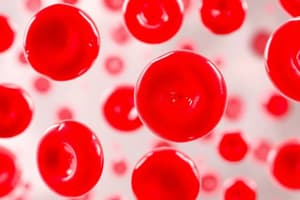Podcast
Questions and Answers
What is the name of the crisis characterized by pleuritic chest pain, fever, cough, and hypoxia?
What is the name of the crisis characterized by pleuritic chest pain, fever, cough, and hypoxia?
- Anaemia
- Acute chest syndrome (correct)
- Sickling crises
- Pulmonary hypertension
Pregnant women with sickle cell disease are at higher risk of preeclampsia.
Pregnant women with sickle cell disease are at higher risk of preeclampsia.
True (A)
What is the recommended dosage of folic acid supplementation for pregnant women with sickle cell disease?
What is the recommended dosage of folic acid supplementation for pregnant women with sickle cell disease?
5mg daily
Screening for high-risk populations can be done by _______________________.
Screening for high-risk populations can be done by _______________________.
Match the following complications with their corresponding category:
Match the following complications with their corresponding category:
What percentage of total hemoglobin is Hb A?
What percentage of total hemoglobin is Hb A?
Hb F is the major adult hemoglobin.
Hb F is the major adult hemoglobin.
What is the result of the sickling of red cells?
What is the result of the sickling of red cells?
Sickle cell disease is caused by a substitution of glutamic acid with __________ at the 6th position in the beta chain of hemoglobin.
Sickle cell disease is caused by a substitution of glutamic acid with __________ at the 6th position in the beta chain of hemoglobin.
Match the types of Sickle Cell Disease with their descriptions:
Match the types of Sickle Cell Disease with their descriptions:
Flashcards are hidden until you start studying
Study Notes
Haemoglobinopathies
- Haemoglobinopathies are a group of inherited blood disorders that affect the structure or production of hemoglobin.
- Two main groups of haemoglobinopathies:
- Inherited disorders of haemoglobin
- Sickle cell disease or sickling disorders
- Thalassemia syndrome
Adult Haemoglobins
- Hb A (a2β2): major adult haemoglobin, 95% of total
- Hb A2 (a2δ2): ~ 2.5% of adult, function unclear
- Hb F (a2γ2): about 1%
Sickle Cell Disease (SCD)
- Caused by substitution of glutamic acid with valine at 6th position in the beta chain of haemoglobin
- Most common inherited condition worldwide
- Types of Sickle Cell Disease:
- Sickle Cell Anemia (HbSS): both parents contribute a sickle cell gene (HbS)
- Sickle Cell Hemoglobin C Disease (HbSC): one parent contributes a sickle cell gene (HbS) and the other a hemoglobin C gene (HbC)
- Sickle Cell Beta Thalassemia (HbS/β-thal): one parent contributes a sickle cell gene (HbS) and the other a beta-thalassemia gene
Pathogenesis
- Red cells become sickle-shaped and haemolyse easily, resulting in anaemia and jaundice, under conditions of hypoxia, cold, acidosis, and dehydration
- Sickle cells are rigid and fail to pass through the microcirculation, causing intravascular thrombosis and vaso-occlusive symptoms
- Can lead to tissue infarction, renal damage, splenomegaly, hepatomegaly, pulmonary infraction, cerebrovascular accidents, and leg ulcers
Complications
- Acute painful sickling crises
- Early onset preeclampsia and HELLP syndrome
- Infection like pyelonephritis and puerperal sepsis
- Thrombosis
- Cardiac dysfunction
- Perinatal complications:
- Miscarriage and preterm delivery
- Intrauterine growth restriction
- Intrauterine foetal death
- Iso-immunisation and haemolytic disease of new-born
Management
- Preconceptional:
- Plan pregnancy and assess chronic disease for end-organ damage
- Identify women with proteinuria and proliferative retinopathy
- Screen for iron overload and perform chelation before pregnancy
- Screen for red cell antibodies to prevent haemolytic disease of new-born
- Antepartum management:
- Avoid precipitating factors
- Folic acid supplementation (5mg daily)
- Hepatitis B vaccination
- Other vaccinations (influenza, swine flu, meningococcal, and pneumococcal)
- Hydroxyurea should be stopped at least 3 months preconceptionally
Studying That Suits You
Use AI to generate personalized quizzes and flashcards to suit your learning preferences.




